Brain pathology
New insights into early cognitive markers of Alzheimer's
New research led by the University of Hertfordshire, may significantly change the understanding of cognitive processes that are most impaired at very early stages of Alzheimer's disease. The findings could potentially be used to detect the condition at an earlier stage and improve diagnostic accuracy, by creating new cognitive tests that are more sensitive to brain pathology than ones currently in use.

The research discovered that people with amnestic Mild Cognitive Impairment (aMCI) - at increased risk of developing Alzheimer's disease - found easy, spontaneous prospective memory tasks to be cognitively as demanding as more difficult, attentionally demanding tasks. This is in stark contrast to healthy adults, who normally struggle with more difficult tasks as they age, but not with easy tasks based on spontaneous 'pop up' experiences.
Prospective memory tasks
Most tests, currently used for the diagnosis of Alzheimer's disease, involve tasks that require deliberate recall of previously studied information (retrospective memory). However, in everyday life, people often have to remember to do things in future, for example, remember to take a medication after breakfast or call the bank in the afternoon. Often these prospective memory tasks are accompanied by spontaneous retrieval of intended action, for example, the intention to take a pill may 'pop' into mind when seeing a pill box on a table. Sometimes prospective remembering may require more attention, and involve checking the environment for the right cues or the elapsed time. Therefore, studying prospective memory is important because it can address the question about which cognitive processes (deliberate and effortful or simple and spontaneous) are more disrupted at the very early stages of the Alzheimer's disease. The research study, funded by the European Commission Marie Sklodowska-Curie Research Fellowship (the Fellow - Prof. Agnieszka Niedzwienska), addressed this question by studying prospective memory in people with aMCI who have increased conversion rates to Alzheimer's disease and are most likely to benefit from early diagnosis and disease management.
Counterintuitive findings
During the study, 38 people with aMCI and 46 healthy older adults completed a highly engaging quiz-like task of identifying the profession of famous faces. An additional prospective memory task involved remembering to do something while being engaged in this main activity: half of the participants had to remember to respond to pictures depicting certain professions (e.g., politicians), and another half had to respond to certain physical features of a person presented (e.g., people wearing glasses). Responding to glasses is cognitively a more difficult task than responding to politicians because it involves strategic monitoring for a feature that is irrelevant when making judgments about professions. Results showed that in comparison to the healthy group, participants with aMCI were significantly more impaired on responding to pictures of politicians (an easy task relying on spontaneous retrieval processes), but there were no group differences in responding to faces with glasses (a more difficult task relying on strategic monitoring). These counterintuitive findings suggest that easy cognitive tasks, measuring spontaneous retrieval or 'pop up' experiences, are disproportionately more impaired in individuals with aMCI than performance on more cognitively demanding episodic memory tasks, currently used in tests for the diagnosis of Alzheimer's disease.
Dementia - a key 21st century challenge
Lia Kvavilashvili, Professor of Cognitive Psychology at the University of Hertfordshire, said: "Dementia is one of the key 21st century challenges. It is on the rise and presents significant challenges to healthcare as well as wider society. In the absence of pharmacological cure, early identification and disease management has become an urgent priority for clinicians and caregivers. However, there is lack of clarity about diagnostic accuracy of tests for amnestic Mild Cognitive Impairment (aMCI), with no gold standard for diagnosis. Tests used to diagnose early stage Alzheimer's involve cognitively demanding episodic memory tasks - for example, recalling lists of single words, word pairs or stories. However, our results suggest that when patients with aMCI perform these tasks they are able to partially compensate by adopting strategic processes with their relatively intact frontal lobes (that get compromised at later stages of disease), and as a result currently used diagnostic tests are not as accurate as they could be. In stark contrast, people in the very early stages of Alzheimer's appear to struggle with automatic spontaneous tasks; for example recalling spontaneous memories or remembering the need to carry out tasks in the future. These things are considered easy in healthy adults who show little impairment. It is significant that people with aMCI show disproportionately more impairment on easy tasks, as this significantly changes our understanding of what goes first in disease. This can help us to devise methods to detect the onset of Alzheimer's early. We now need to launch a systematic and more targeted investigation of this spontaneous retrieval deficit in people with aMCI by studying other cognitive tasks with spontaneous retrieval. This may ultimately lead to the development of a set of new (and simple) tests that can be used in primary and secondary care to increase the accuracy of diagnosis at pre-clinical and aMCI stages of Alzheimer's disease".
Source: University of Hertfordshire
18.05.2017





